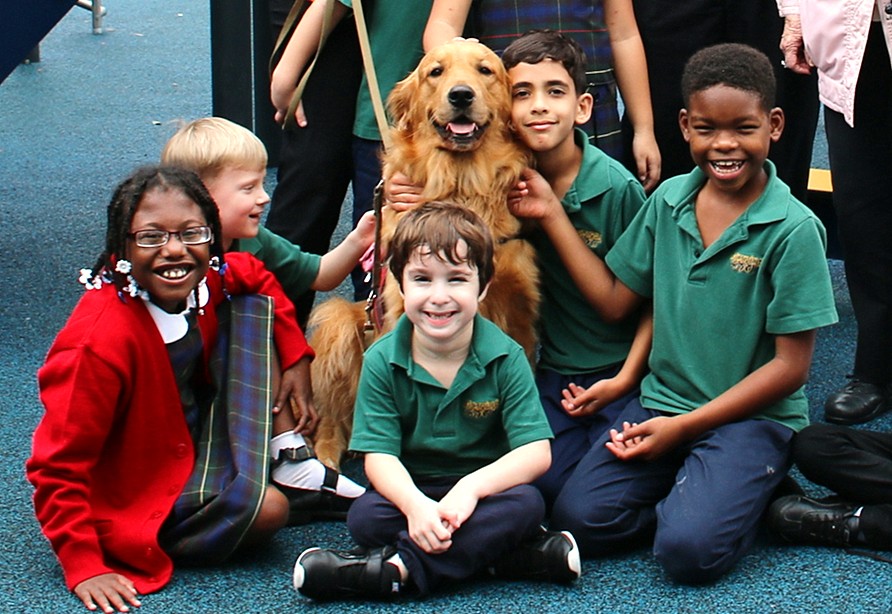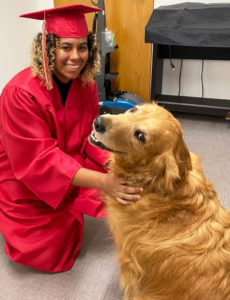
As COVID-19 sent brick-and-mortar education into a tailspin this spring, students at one North Florida school realized what they missed most was a creature with four legs and a wet nose.
That’s why staff at Morning Star Catholic School in Jacksonville featured Nova, a golden retriever who likes to lean into humans’ legs while being petted, in a video created to help families feel connected during distance learning.
 Trained by Project Chance to help students on the autism spectrum, Nova and another service dog, Corbin, have coaxed anxious students out of cars, lunched with students who met behavior goals and served as an audience to beginning readers to build their confidence.
Trained by Project Chance to help students on the autism spectrum, Nova and another service dog, Corbin, have coaxed anxious students out of cars, lunched with students who met behavior goals and served as an audience to beginning readers to build their confidence.
Graduating seniors had a chance to hug Nova goodbye when they came to the school one at a time for cap and gown photos.
“They miss her terribly, and she misses them terribly, too,” said principal Jean Barnes.
The school, one of six Morning Star Catholic schools in Florida that specialize in teaching students with special needs, serves 138 children with learning differences, including 20 who receive Gardiner Scholarships for students with unique abilities. (Gardiner Scholarships are administered by Step Up For Students, which hosts this blog.)
Despite missing out on the usual end-of-year activities, students at other Catholic schools that serve children with learning differences haven’t been deprived of therapies and services traditionally provided.
Fourteen-year-old Hannah Halperin, in her third year at St. Mary Academy in Sarasota, is continuing to receive weekly speech therapy as well as occupational therapy remotely.
“I’m getting to hear her speech therapy, and I can tell it’s very good,” said her father, Gary Halperin.
Occupational therapy has proved a bit more challenging because it relies on hands-on activities. Still, Hannah, who has Down syndrome, was able to take therapy supplies home before the campus shut down in March. Therapists are encouraging her to squeeze a tennis ball and do floor exercises to maintain muscle tone. She also works on fine motor skills by writing and picking up toothpicks, and she attends group therapy sessions via Google Meet.
“They use computers at school, so that made the transition easier,” Halperin said.
St. Mary serves 74 students in grades K-8, nearly a third of whom receive a state scholarship. According to the school website, it’s the only Catholic school providing services for students with special needs in Sarasota, Manatee, Charlotte, Collier, DeSoto, Glades, Hardee, Hendry and Highlands counties. Its slogan is “Where Dreams Are Free.”
In addition to live Zoom classes, teachers are holding “office hours” for student questions, scheduling small group sessions for interventions and conducting assessments.
“Our school counselor meets with me once a week to discuss students’ needs (and) both my counselor and I attend meetings with teachers once a week to identify students at risk,” principal Rebecca Reynolds said. “A plan is then made for follow-up interventions and care.”
At Morning Star Catholic School in Orlando, specialists have created service plans for each student based on their individual education plans, which are required by law for qualified students. The plans also are based on current assessments, teacher observations and therapists’ recommendations.
“All the teachers have been using these to help individualize instruction for their students and allow any accommodations or flexibility needed to reach their goals and the mastery of the skills being taught,” said principal Alicia Abbey.
Of the school’s 66 students in grades K-12, 20 percent receive Gardiner Scholarships.
Other ways students are being accommodated include allowing extended time to complete assignments, holding small group instruction via Zoom videoconferencing for reading and math, and one-on-one instruction, with parents present for safety protocol.
Additionally, a guidance counselor has reached out to families to let them know they’re available if needed, and the school’s transition program for students moving from high school to life after school has remained in place.
Abbey said the school has continued to provide speech, language and music therapy as well as occupational and physical therapy through a virtual program.
“Some students have even been able to continue to see their behavior therapist at home,” she said. “It depends on both the comfort level of the therapist and family, as well as their availability.”


